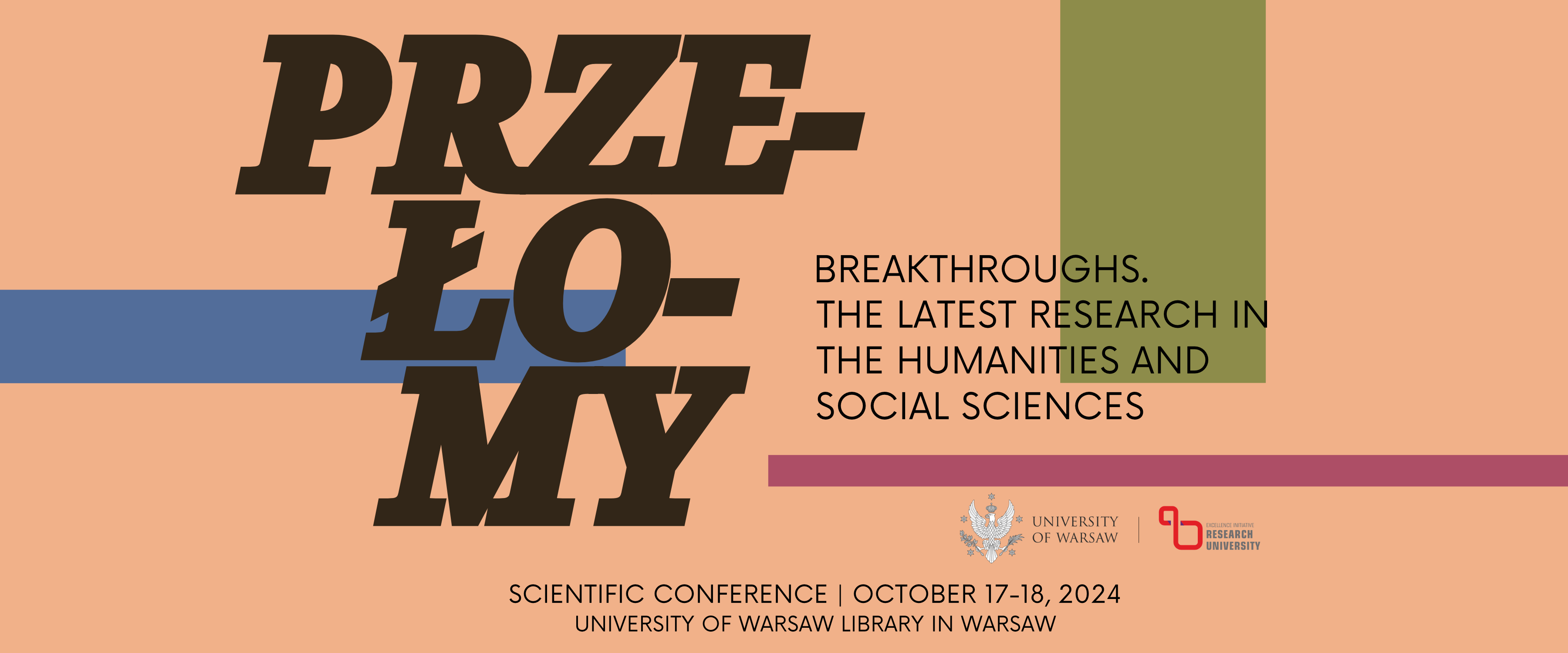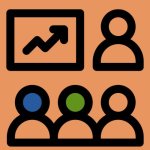Breakthroughs. The latest research in the humanities and social sciences (ed. 2024)

The conference “Breakthroughs. The latest research in the humanities and social sciences” was held on 17-18 October 2024 at the University of Warsaw Library.
The conference presented the latest achievements of female and male scientists implementing projects under the New Ideas grants and other calls for research projects in Priority Research Areas IV and V. During the event, the results of research carried out in POB Activities IV and V were also presented.
The main objective of the meeting was to establish scientific contacts and cooperation between the winners and awardees of the New Ideas grants and other competitions for research projects in the humanities and social sciences.
The conference programme included two days full of inspiring events. In addition to conference speeches and discussions, there was a panel with ERC grant winners and laureates at the UW on the process of forming ideas for research projects, training for grant recipients and meetings with science managers. A networking space was available throughout the conference where participants could exchange research and project experiences.
If you have any questions about the conference, please contact research.managers@uw.edu.pl
Organisational Committee
- dr hab. Michał Bilewicz
- dr hab. Michał Brzeziński
- dr hab. Tomasz Gackowski, prof. ucz.
- dr hab. Konrad Jankowski, prof. ucz.
- prof. dr hab. Paweł Kaczmarczyk
- Dorota Kazimierczak
- dr Magdalena Kozłowska
- dr hab. Kamil Kuraszkiewicz, prof. ucz.
- dr hab. Agnieszka Otwinowska-Kasztelanic, prof. ucz.
- prof. dr hab. Justyna Olko
- dr hab. Marek Pawełczak, prof. ucz.
- dr hab. Paweł Piszczatowski, prof. ucz.
- dr Adam Płoszaj
- dr Yanna Popova
- Dominik Purchała
- Adam Suwiński
- Michał Szostek
- dr Sebastian Szymański
- dr hab. Katarzyna Śledziewska, prof. ucz.
- prof. dr hab. Robert Wiśniewski
- dr hab. Renata Włoch, prof. ucz.
- dr Julia Wrede
Programme
Day one: 17.10.2024
| Room 316 | Room 315 | |
|---|---|---|
| 08:30 – 09:00 | registration of participants + coffee | |
| 09:00 – 09:30 | Welcome, Dr Julia Wrede, Adam Suwiński Opening ceremony, Vice-Rector Prof. Zygmunt Lalak, Head of the IDUB Programme |
|
| 09:30 – 10:50 | SESSION 1 | SESSION 2 |
| Agnieszka Dynak, Lepszy start w naukę języka – znaczenie przekonań rodzicielskich na temat rozwoju językowego i wielojęzyczności | Magdalena Grabowska, Subiektywny dobrostan i poziom stresu wśród Ukraińców w Polsce | |
| Magdalena Łuniewska, Czy rodzice wiedzą, jakie słowa znają ich dzieci? | Helena Marzec-Gołąb, Aleksandra Gulińska, Rozpoznanie i mapowanie nowych źródeł danych w obszarze mobilności i nierówności w wybranych grupach kobiet w Polsce i w Europie: wyzwania w poszukiwaniu danych | |
| Agnieszka Otwinowska-Kasztelanic, Prezentacja Multiligualism Research Hub | Konrad Jankowski, Prezentacja Wewnętrznego Panelu Badawczego UW | |
| Katarzyna Wasilewska, Badania interdyscyplinarne – możliwości i wyzwania | Mikołaj Biesaga, Regulacyjna Teoria Wpływu Społecznego: wpływ zaufania do źródła oraz ważności na poziom poszukiwanych informacji | |
| 10:50 – 11:10 | coffee break | |
| 11:10 – 12:30 | SESSION 3 | SESSION 4 |
| Natalia Letki, Zwolennicy populistycznej prawicy w kontekście ukraińskiego kryzysu uchodźczego: eksperymentalne dane z Niemiec, Polski i Wegier | Justyna Włodarczyk, Plastic Domestication: plasticity as a methodology for researching literary representations of companion species | |
| Magdalena Roszczyńska-Kurasińska, Trajectories of volunteering in the context of the ongoing refugee crisis | Joanna Ziarkowska, Making Up Indian Biocitizens: Americanization through Medical Education in Sioux San Sun (1938-1941), a TB Sanatorium Paper. | |
| Anna Mierzecka, Rodzice wobec szczepień: postawy, autorytety i obawy | Anna Pochmara, A Farmer from the Ghetto: Black Agrarianism in Paul Beatty’s The Sellout | |
| Urszula Ługowska, Żydzi aszkenazyjscy w Ameryce Łacińskiej – literackie mapy pamięci Polski | Paweł Piszczatowski Informacja o Działaniu “Nieantropocentryczna podmiotowość kulturowa” | |
| 12:30 – 13:30 | lunch break | |
| 13:30 – 15:15 | SESSION 5 | |
| Panel discussion with ERC laureates
The panel will be attended by: |
||
| ERC Incubator
Information from Adam Suwinski, science manager, on the support programme prepared by the UW science management team for researchers intending to submit proposals in European Research Commission competitions. |
||
| How to turn an idea into a project
The presentation by Marta Kowol, science manager, will focus on the journey from a research idea to a full-fledged scientific project ready for submission to a grant competition. The talk will discuss the key elements that make up a good project, the logic and techniques for preparing a project, and effective grant submission strategies. |
||
| Information from the Office for International Research and Liaison and the Research Services Office on the scope of their activities and opportunities for collaboration. | ||
| 15:15 – 15:30 | coffee break | |
| 15:30 – 16:30 | SESSION 6 | |
| Przemysław Kordos, Dominika Oramus, Zwrot fantastyczny w literaturze polskiej. W poszukiwaniu sposobów opisania świata | ||
| Mateusz Salwa, Sztuka naukowego wizualizowania | ||
| Małgorzata Litwinowicz-Droździel, Historie Bałtyku, projekt badawczy, opowieść | ||
Day two: 18.10.2024
| Room 316 | Room 315 | |
|---|---|---|
| 09:30 – 10:50 | SESSION 7 | SESSION 8 |
| Dominika Pszczółkowska, Jak migranci wybierają kraje docelowe? | Agnieszka Kacprzak, Zjawisko pozakupowej ekspozycji na internetowe recenzje: Jak (a)typowe recenzje kształtują satysfakcję i lojalność konsumentów? | |
| Ludmiła Janion, Neoliberalizacja męskiej heteroseksualności w czasach transformacji (1987-1993) | Marlena Sztyber-Popko, Perswazyjność medialnych komunikatów medyków w okresie pandemii COVID-19 w Polsce | |
| Gregory Haimovich, The chronic deseases of modernity, health promotion and indigenous illness discourse in Sierra Norte de Puebla: in search for an innovative approach | Konrad Jankowski, Prezentacja Wewnętrznego Panelu Badawczego UW | |
| Justyna Olko, Prezentacja Działania “Różnorodność językowo-kulturowa, bioróżnodność i środowisko” | Mikołaj Biesaga, Regulacyjna Teoria Wpływu Społecznego: wpływ zaufania do źródła oraz ważności na poziom poszukiwanych informacji | |
| 10:50 – 11:00 | coffee break | |
| 11:00 – 12:20 | SESSION 9 | SESSION 10 |
| Hanna Paulouskaya, Antyk animowany w republikach ZSRR: Narzędzie propagandy (de)kolonialnej | Magdalena Radkowska-Walkowicz, Czy można o tym porozmawiać z dzieckiem? Wrodzony przerost nadnerczy a etyka badań społecznych z dziećmi i o dzieciach | |
| Julian Zubek, „Bycie razem” w improwizowanym tańcu jako proces budowania międzyosobowych synergii | Karolina Broś, Praktyka czyni mistrza – Doświadczeni tłumacze ustni i studenci wykazują różne wzorce rozszerzania źrenic w reakcji na mowę akcentowaną | |
| Tomasz Oleksy, Czy jesteśmy gotowi na wirtualizację życia? Przywiązanie do miejsc i lęk przed technologią w czasie rozwoju metawersum i Augmented Reality | Adam Płoszaj, Prezentacja Laboratorium Badań Naukoznawczych | |
| Sebastian Szymański, Prezentacja Centrum Badania Ryzyka Systemowego | Dominik Purchała, Prezentacja Działania “Humanistyka Cyfrowa” | |
| 12:20 – 13:20 | lunch break | |
| 13:20 – 14:40 | SESSION 11 | SESSION 12 |
| Katarzyna Zagórska, Benefit-cost analysis of removing environmentally hazardous substances from sunk shipwrecks: Study for the Baltic Sea in Poland | Joanna Ciesielska, Na progu wielkości: Założyciele królestwa Alwy | |
| Sara Bojarczuk, Barbara Jancewicz, Discrimination in the rental housing market: a field experiment in Poland | Magdalena Pinker, Mariusz Drzewiecki, Symbolika bram fatymidzkich | |
| Joanna Mazur, Effectiveness of short-term rental regulation: Barcelona as a case study | Olga Gaidai, Wojna i medycyna. Lekarze w walce z epidemiami dżumy w południowo-zachodnich guberniach Rosji w latach 1770-1812. | |
| Ewa Zegler-Poleska, The Impact of the Virtualization of Scholarly Conferences on the Gender Structure of Conference Contributors | August Grabski, Mechanizmy wzrostu i spadku liczebności mniejszości na przykładzie Żydów w Polsce (1971-2021) | |
| 14:40 – 14:50 | coffee break | |
| 14:50 – 16:10 | SESSION 13 | SESSION 14 |
| Renata Włoch, Jak nie ulec mirażom technosolucjonizmu wspierając rozwój kompetencji cyfrowych? Garść doświadczeń z realizacji projektu INAIR | Kseniya Homel, Infrastruktura wsparcia przedsiębiorczości kobiet z doświadczeniem migracji w Polsce | |
| Wojciech Hardy, Attention economics, czyli jak zasoby uwagi kształtują nasze decyzje w cyfrowym świecie | Maria Zielniewicz, Możliwości kreacyjne plastiku. O figurze lalki na podstawie opowiadania „Życzenie Sabiny” Olgi Tokarczuk | |
| Anna Nicińska, Interdyscyplinarne analizy danych zastanych i zebranych w projekcie CoMobility | Marcin Łączyński, Strukturalne modelowanie narracji w grach fabularnych. Konstrukcja modelu i zastosowania | |
| Michał Bylicki, Who values online privacy? The impact of digital literacy, experience and usage patterns on the evaluation of online privacy | Yanna Popova, Prezentacja Centrum Badań nad Kulturą, Językiem i Umysłem | |
| 16:10 – 16:30 | Conclusion, thanks and farewell | |
Side events

Breakthrough networking space – foyer on 3rd floor.
16-17.10.2024, 09:00-16:30
Throughout the conference, a networking space will be available in the foyer on the third floor, where participants and attendees can meet and exchange experiences.
We encourage you to use the tables arranged for this purpose. To reserve them, simply sign up on the list provided on the day of the conference. We also ask you to respect the silence that prevails in other parts of the library.

Decolonial approaches to studying history and linguistic-cultural heritage Seminar
16.10.2024, 16:45-18:15
On the day preceding the conference, a Decolonial approaches to studying history and linguistic-cultural heritage Seminar will be held in room 9 of the Faculty of “Artes Liberales” at ul. Dobra 72, during which will be presented the project “Multilingual worlds – neglected histories. Uncovering their emergence, continuity and loss in past and present societies (MULTILING-HIST)”, funded by an ERC Consolidator grant. The seminar is part of a working meeting of the grant team taking place in parallel with the Breakthroughs Conference.
Multilingualism is a fact of our past, present and future. However, it is often underrepresented or even silenced in historical narratives. Although multilingualism has been the norm throughout human history, the underlying mechanisms are still only partially understood by us. The EU-funded MULTILING-HIST project will provide a fuller explanation of how local multilingualism arises and is maintained, why it is gradually being erased and how it can be born again. Combining historical and contemporary data, the team investigates the main centres of multilingualism in Central and Eastern Europe, Mesoamerica, South Africa and the Vanuatu archipelago. Through a combination of historical and contemporary data, qualitative and quantitative methods, mathematical modelling and GIS mapping, the MULTILING-HIST project team will provide reliable predictions to improve existing language policies and educational strategies.
If you are interested in attending, please send your registration request to crp@al.uw.edu.pl by 15 October.

Scientific meeting of researchers carrying out research in the UW Internal Research Panel
17.10.2024, 11:00-12:00
Not only existing, but also future users of the Internal Research Panel are invited to attend the meeting. The event will take the form of an open discussion aimed at sharing experiences of implementing research in the Panel and discussing how to use the tool. During the meeting, suggestions will be made on the functioning of the Panel (e.g. pre-selection questions, recruitment, how to submit surveys), problems encountered will be discussed, and participants will also be able to receive detailed guidelines on how to operate the Panel.
The UW Internal Research Panel is a tool that enables the recruitment of participants for various types of research (experimental, survey, online as well as on-site). Students from various UW faculties are registered in the database of potential research subjects. Participants are assured of anonymity and receive ECTS credits for participating in research. Depending on the needs of a particular project, invitations to research are extended to all registered students or only to specific groups of respondents (of a particular age, gender, field of study, etc.). Socio-demographic diversity, the size of the student population and the ECTS incentive are important assets for the effectiveness of recruiting participants for research. The Internal Research Panel is an initiative implemented as part of the IDUB programme.